What do NordVPN, Skylum, PandaDoc, or HelpWire have in common?
They are successful SaaS companies. And they all used our link-building services to secure hundreds of high-quality backlinks that drive their SEO strategies.
In the article, I will share 15 tried-and-tested SaaS link-building strategies that we used to build such links.
I will also answer questions about the unique challenges SaaS companies face that make link-building tricky and help you choose the best link-building service provider for your needs (yes, Editorial Link is a strong contender!)
How to Do B2B SaaS Link Building
Here are the 15 strategies I use to build links for our SaaS clients. Ones that prove successful again and again.
1. Guest posting
Guest posting is one of the most popular link-building techniques. It involves writing a guest article for another website in which you place a backlink to your website.
Here's an example of a guest post we wrote for our client, HelpWire, published on the eztalks website (DR66).
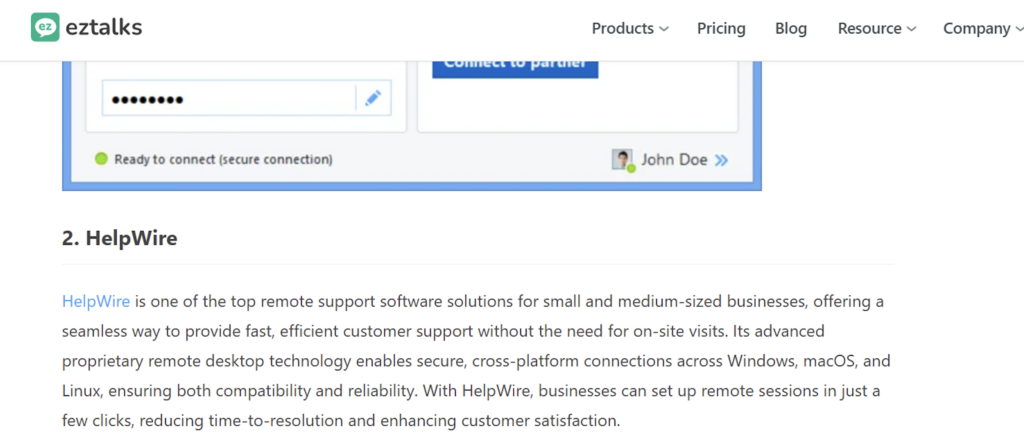
And here's one on CyberDB (DR48).
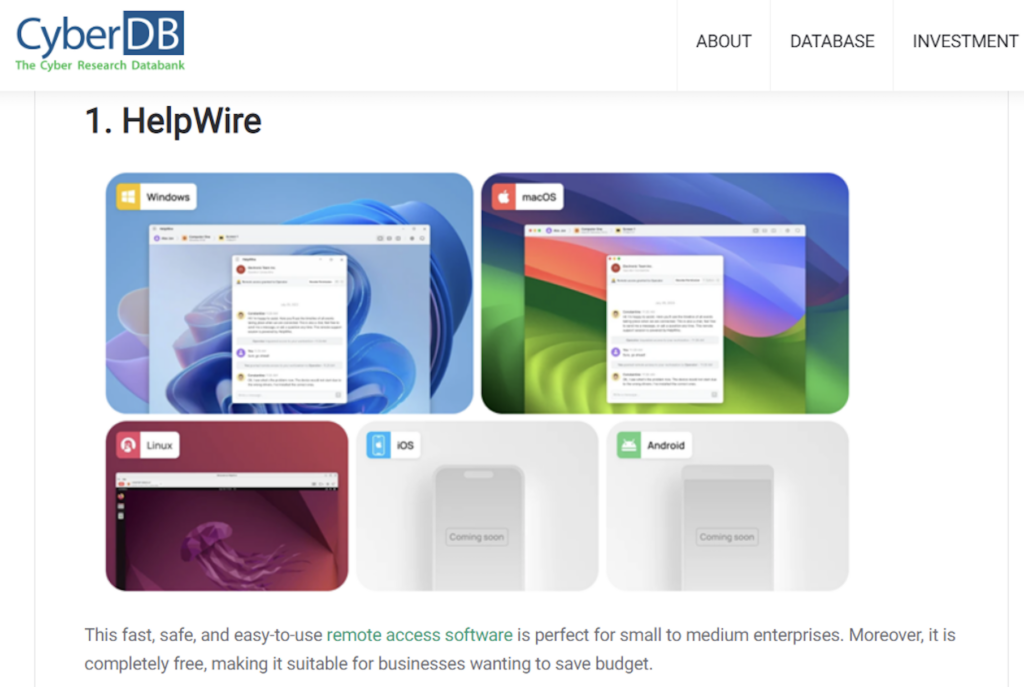
Guest posts are a great source of fresh links, and you have complete control over the quality of the article or the anchor text.
However, finding relevant websites, establishing relationships with webmasters, and creating the post take time, making it a rather resource-intensive strategy. Just check out Irina Maltseva's LinkedIn post:
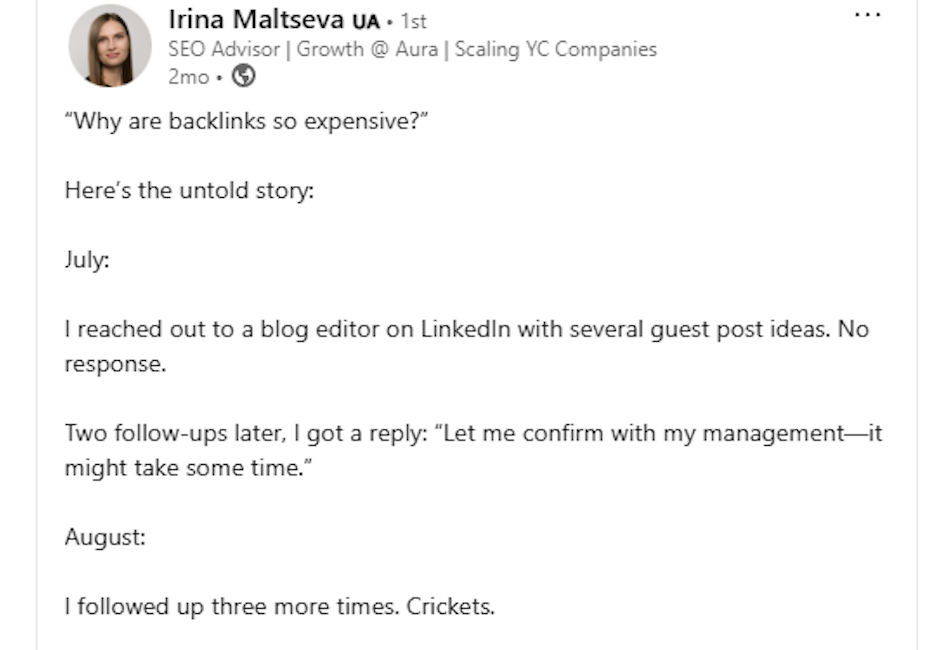
2. Listicle and roundups
Listicles and roundups are curated lists of tools, services, or resources.
Here's an example of such an article from Shopify.
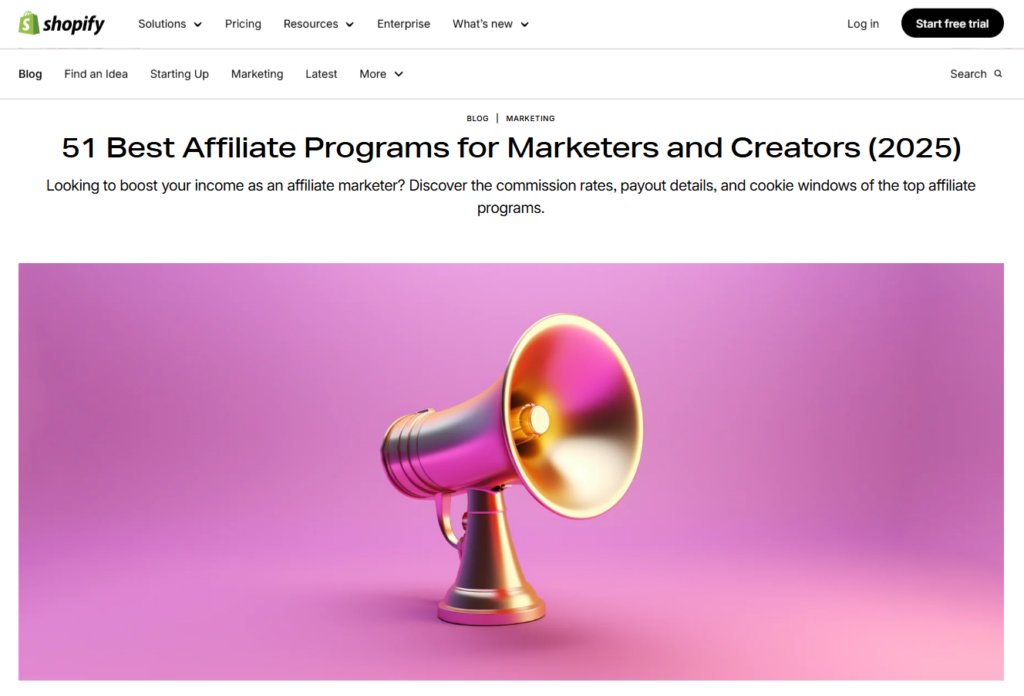
It lists 51 affiliate programs, and NordVPN, our client, is one of them.
And there's no reason why the list shouldn't include your product if you manage to persuade the editor to include it. Considering it's Shopify, it won't be easy, but totally worth it.
For two reasons:
Shopify has a very strong domain - DR95, so it passes lots of link equity to your website.

More importantly, perhaps, the page has nearly 35k visitors every month. The article can send a lot of referral traffic your way. And a lot of potential customers, as Antonio Gabric, the Outreach Manager at Hunter.io, points out:
This type of content, which targets users closer to the bottom of the sales funnel, tends to convert quite well. Therefore, having your business featured in these listicles not only boosts link equity but also generates potential new leads.
An alternative approach would be publishing a listicle featuring your SaaS product as a guest post. However, the results won't be as immediate as inserting your product into an existing article.
3. Broken link building
Broken link building is a classic way to build links for your SaaS website. You look for dead links in content related to your niche, contact the website owners, and suggest your link as a replacement.
Why would they link to you? Because you help them improve their content and reader experience. That’s the theory.
In practice, webmasters often ask for an "incentive" to include your link, and for high-authority domains, this can be substantial.
Nick Malekos, an SEO consultant and former Head of SEO at LearnWorlds, thinks that only about 2-3% of those links are free.
…it’s an overused tactic with a low ROI in links right now. It still works just not greatly. The main issue is that most websites now will either ask for payment or a link as an exchange. Out of 100 broken links, maybe 2-3 will be free, but you might get 5-10 more by exchanges.
Nevertheless, we still use the technique and have been able to secure links for our clients.
4. Infographics
Infographics are highly linkable assets.
Here's an example of an infographic illustrating how tiered link-building works. As you can see, it's not in the original Ahrefs article. Mongools used in theirs. And they link to the Ahrefs article.
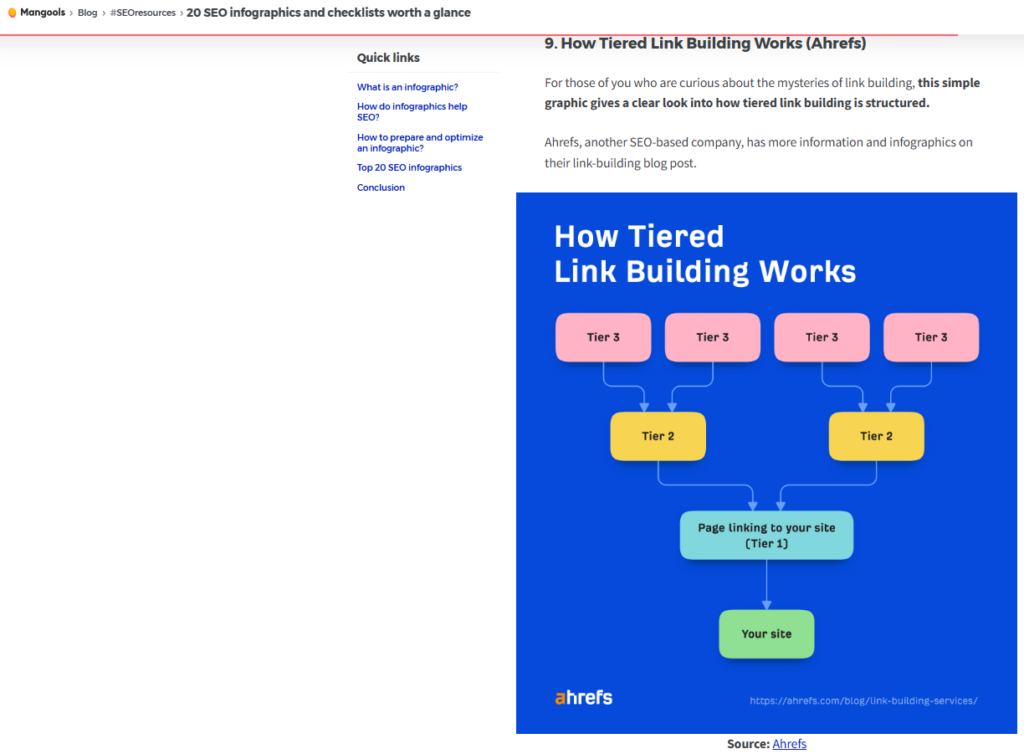
That's a DR82 link for you. In exchange for, let's face it, a rather simple infographic. But one that clearly illustrates a concept, making it easier for readers to digest the information.
We use infographics to build backlinks in two ways:
- To enhance new content—for example, summarizing the key findings of a research report—to accelerate organic link acquisition.
- To add value to existing content so that the authors might include them in the article and link back to the source.
5. Unlinked mentions
An unlinked mention is when somebody writes about your SaaS brand, company, or product but doesn't link to it.
Like in this listicle. It mentions PandaDoc without linking to their site.
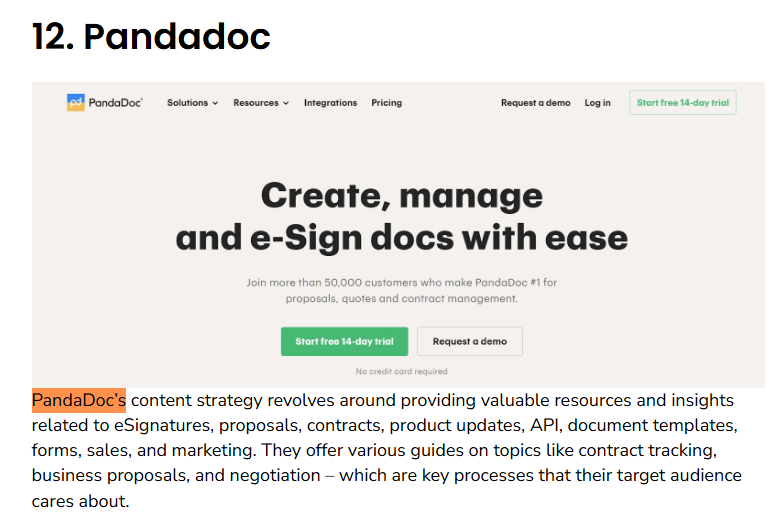
How do such mentions become linked mentions?
You reach out to the owner and ask them to add the link. This should be easier because you don't have to educate them about your company or persuade them it's worth writing about you. They already do it.
As with broken links, the website owner may ask for something in return when you approach them. One way to sweeten the deal is by inviting them to your affiliate program, as LearnWorlds did:
At LearnWorlds, we collaborated with our affiliate department for this. Unlinked brand mentions were sent to them and they reached out to get an affiliate link + increase our order in the page.
6. Free tools
Free tools that solve real user problems attract backlinks organically, just like infographics.
For example, the top 5 five most linked to Ahrefs pages include two free tools: the free backlink checker, and the keyword generator. They have links from 6,247 and 4,514 referring domains, respectively.
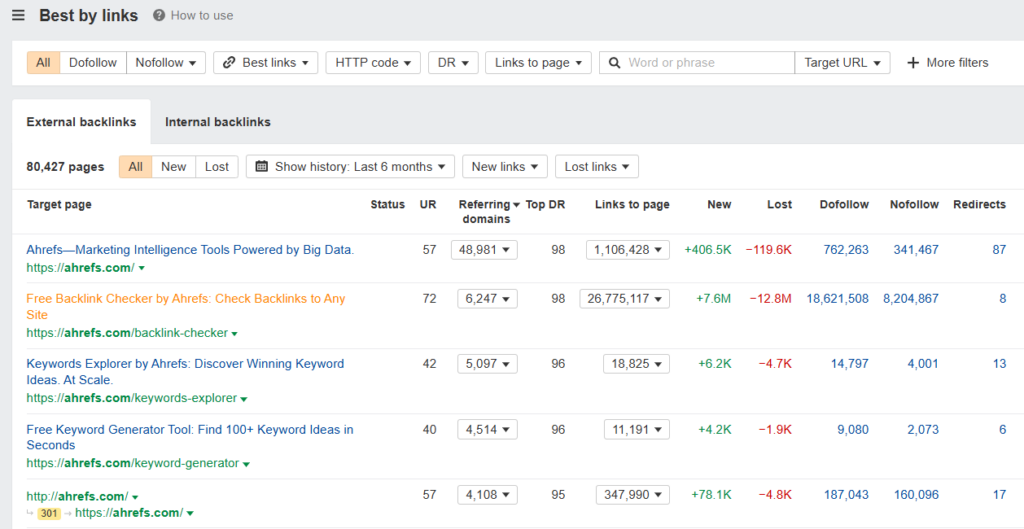
Surfer, the SEO optimization tool, has over 1.4k unique backlinks from their Chrome extension. Only their homepage has more.
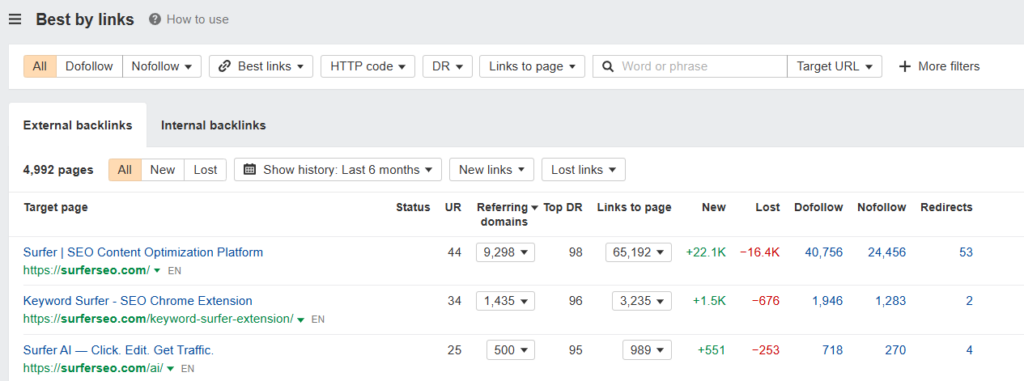
The best part?
As a SaaS company, you don't have to build a new tool from scratch. You can offer an existing feature free of charge.
By doing so, you attract backlinks and showcase your product value to prospective customers.
If you decide to do this, consider limiting the feature's capabilities, for example, by introducing a usage cap. Otherwise, the users won't have a reason to buy your product.
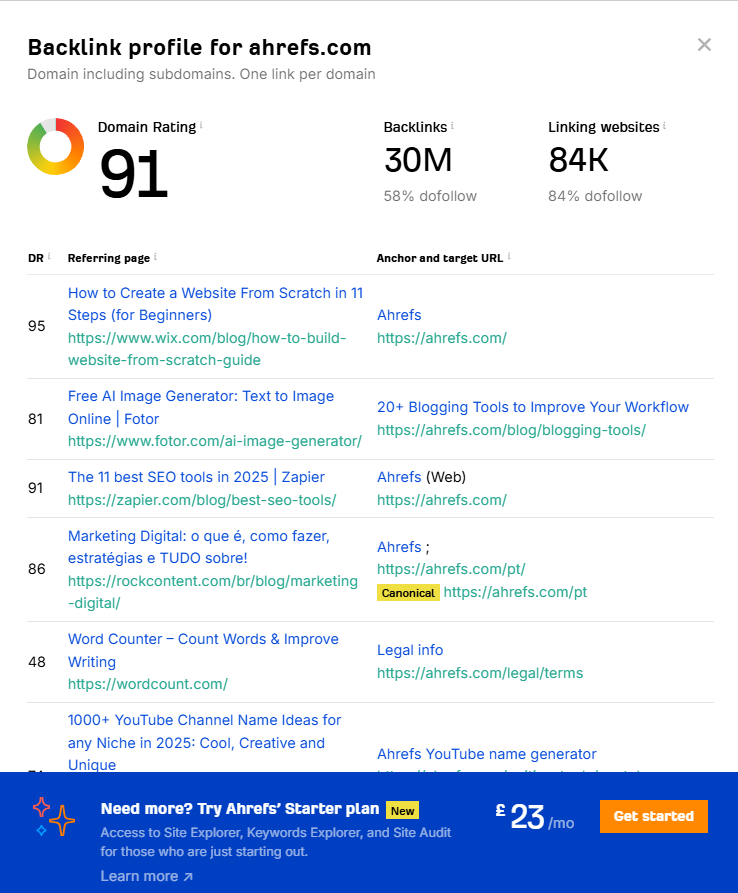
7. Editorial links
An editorial link is added by the writer or editor to add value to their content.
For example, in this Hubspot article, the author discusses the difference between graymailing and graylisting for users with new dedicated IPs.
The paragraph includes a link to the NordVPN landing page where readers can learn more about dedicated IPs. And get one if they decide they need one.
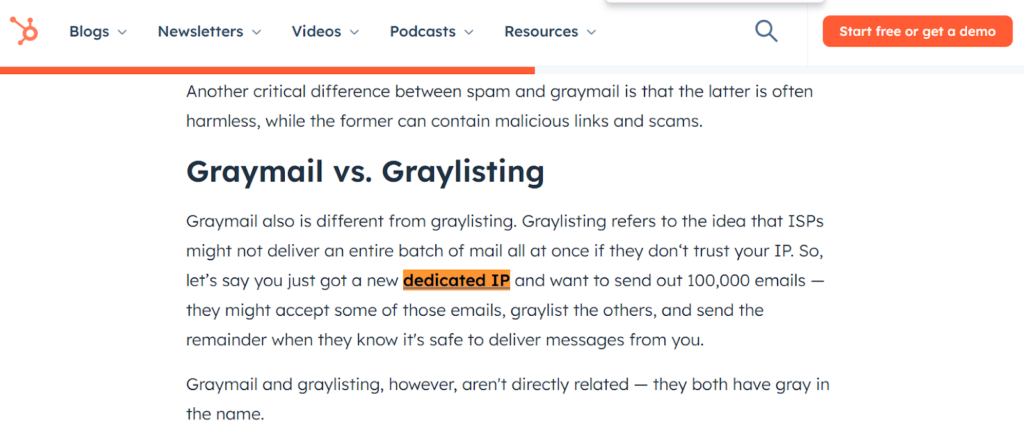
Of course, editorial links can be added later, long after the article is published. When it already ranks and attracts traffic. This reduces the payback period.
As you already suspect, our agency specializes in editorial links, so if you'd like a Hubspot or Forbes link, we can help.
8. Publish research reports and statistics roundups
Writers desperately need reliable stats to support their arguments and increase their credibility. This makes research reports and statistics roundups, like the This National University blog post, some of the best link magnets.
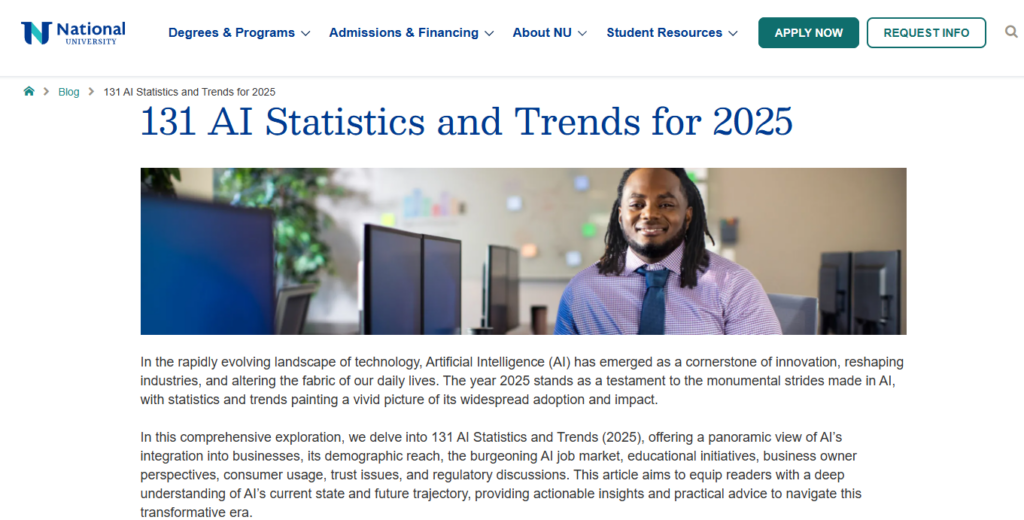
Since March 2024, this article has attracted over 1k backlinks from 422 referring domains.

Its SERP competitor, published by Exploding Topics, is currently in the #2 spot and has even more — 2.2k links from 930 unique domains.
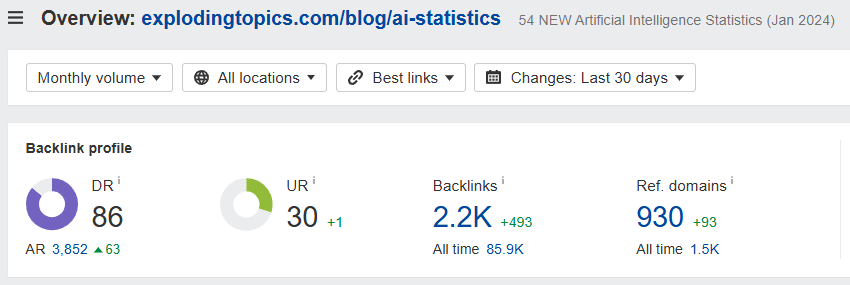
As you can see, neither of these articles cites proprietary data. The authors collated stats from various sources. This makes it a feasible link-building tactic also for companies without resources for original research.
9. Provide testimonials and get interviewed for case studies
Providing testimonials to your business partners is a fairly easy way to secure a link. You already have an established relationship, which reduces the required effort. Sometimes, they may even reach out to you with the request.
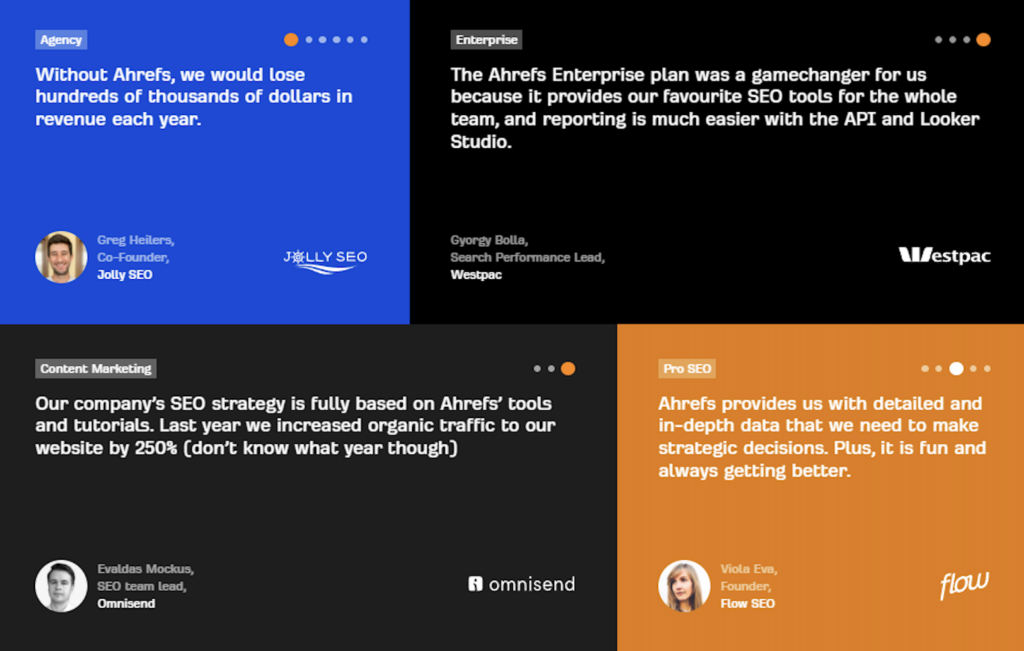
Getting interviewed for a case study, like the Great Question below, goes one step further. It is more time-consuming but increases your online exposure more than a testimonial.
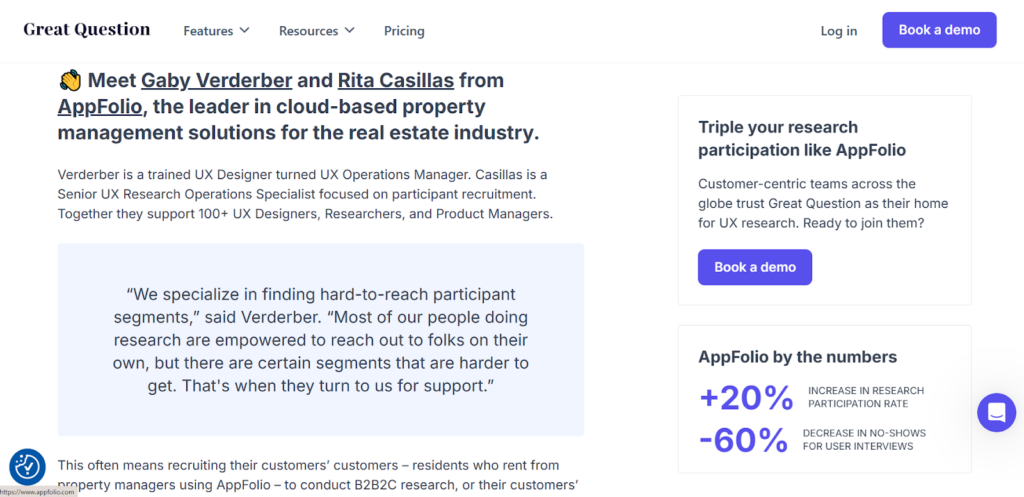
10. HARO link building
HARO stands for Help the Reporter Out, and it used to be a service that connected journalists with experts. By responding to reporter requests, you could land links from large media outlets with powerful domains.
Sadly, HARO, or Connectively as it was later called, has closed. However, there are other similar services, some of them more suitable for SaaS companies, like Help a B2B Writer or Featured.
We used HARO & HelpAB2BWriter. The latter is more effective and relevant for our niche, B2B SaaS, but takes a lot of effort.
As Google promotes content written by people with real-life experience and genuine expertise, companies are keen to include expert comments and insights. That's your chance to get backlinks.
11. Sponsor or organize industry events
Sponsoring or organizing industry events, like conferences or meetups, is another way to get links, for example, on the event website.
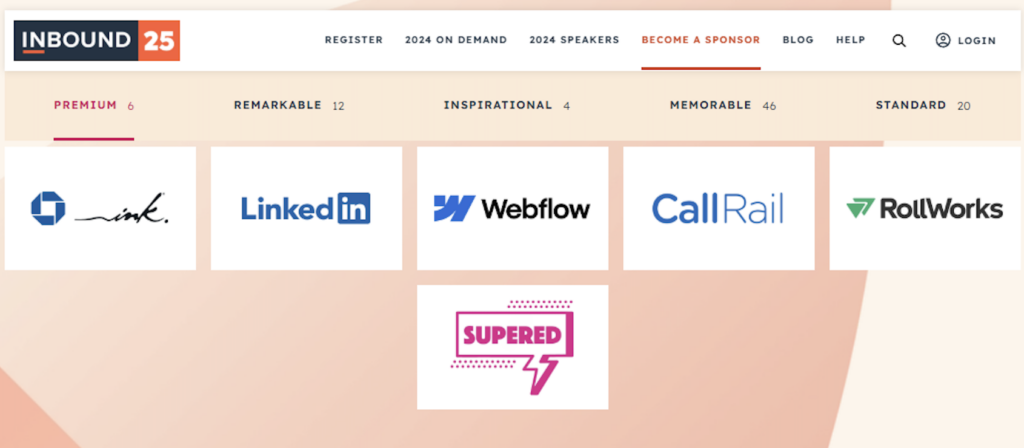
Links aren’t the main benefit, though. Considering the costs, they wouldn't be worth the money—you can get a link from a similar domain for much less.
It’s all about the exposure.
For example, INBOUND, a marketing conference organized by Hubspot, sees 11k in-person attendees and around 100k join virtually. That’s a lot of potential customers.
Of course, sponsoring such an event isn't a viable option for most SaaS startups.
However, there are plenty of local opportunities. For example, LearnWorlds used to sponsor hackathons that would regularly get press coverage (and links).
12. Take part in podcasts and interviews
Appearing in podcasts and interviews (or sending your CEO to them) can also get you a juicy link or two.
Here's an example of an episode of Aaron Zakowski's podcast featuring the founder and CEO of Fireflies.ai.
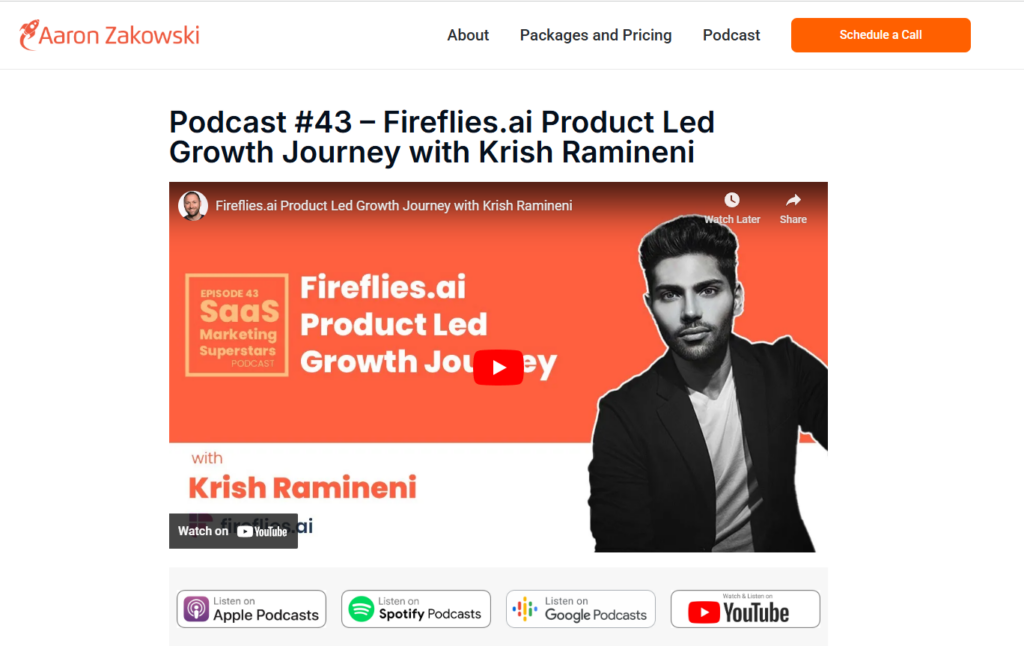
When you scroll down the page, you will see a list of links to different resources mentioned in the episode, including the Fireflies.ai website. With a live link.
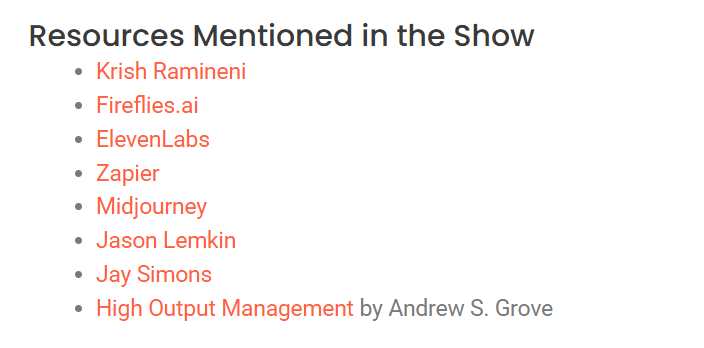
Excellent, right? Here's the catch:
Most people listen to podcasts through iTunes or Spotify, and they don't allow clickable links, and not all podcasts have websites.
But don't sweat over it. Just like with conferences, it's not about the link juice but about the visibility. Get people interested, and they will find you.
13. List your product in SaaS directories and review sites
Getting your business listed in SaaS directories like G2 or Capterra is essential for a few reasons:
- They offer links—mostly nofollow ones, but still.
- They get your business in front of people looking for a SaaS tool.
- They host reviews that provide social proof that can convince prospects to sign up for the free trial or book a demo.
Here's a list of 10 directories to start with:
- G2 (DR89)
- Capterra (DR90)
- Sprout24 (DR64)
- TrustRadius (DR81)
- Product Hunt (DR90)
- Software Advice (DR84)
- GetApp (DR82)
- Alternative To (DR79)
- Technology Advice (DR78)
- Crunchbase (DR90).
14. 301 redirect
301 redirects channel the traffic from another domain to your website and its links equity.
How can you get hold of a relevant domain with a strong backlink profile?
One way to do it is by looking for expired domains in your niche on services like GoDaddy.
You can also buy domains from another business. That's what Neil Patel did with Kissmetrics. See that spike in referring domains in 2018?
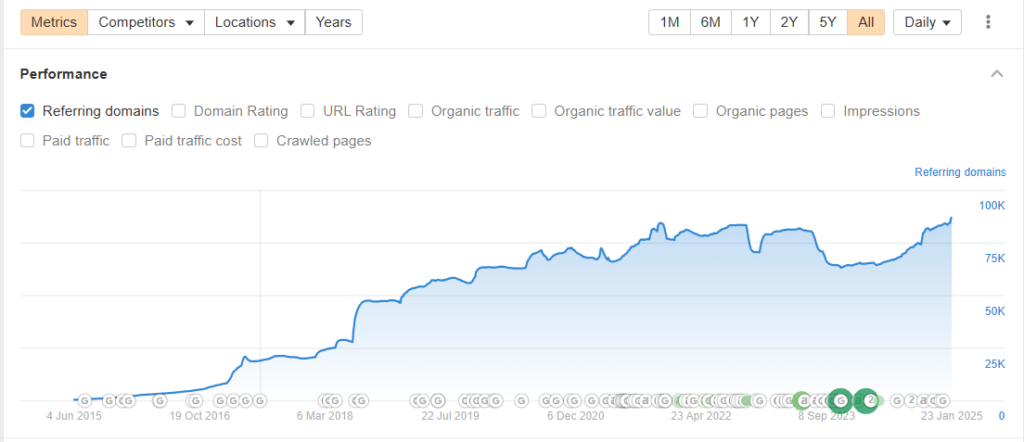
As a SaaS business, you can go one step further and buy a whole business or a service that complements your offerings. You then embed it in your main product so that it doesn't need its website.
You can find online businesses through services like Empire Flippers.
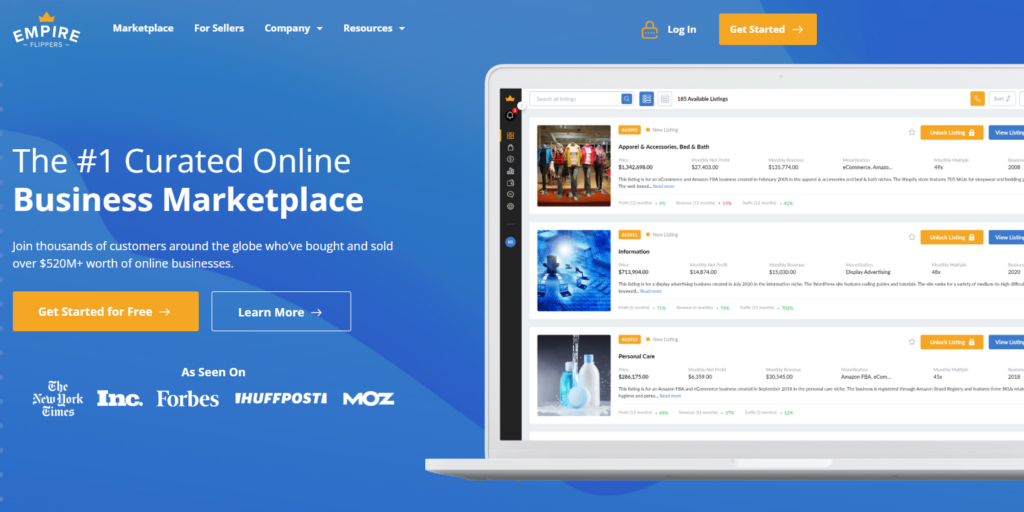
Or ask around online:
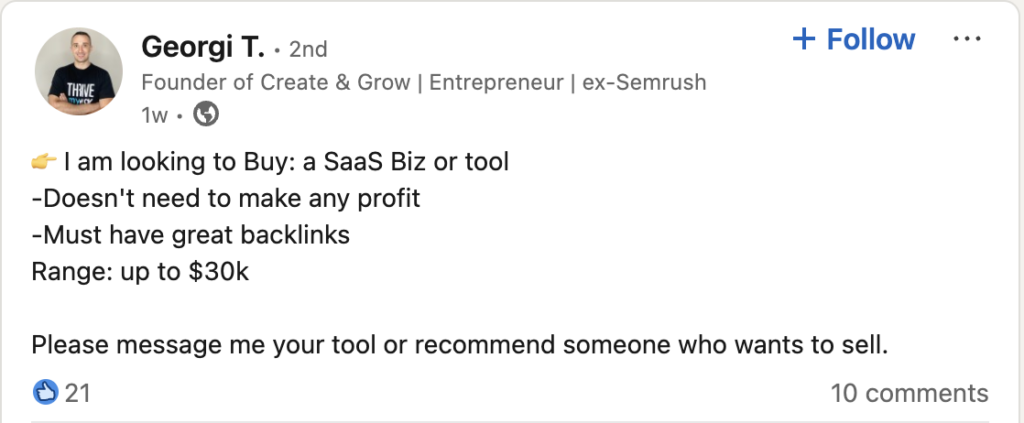
Of course, this can be potentially a costly investment, so again, not necessarily something you would do just for the links.
15. Q&A sites
Q&A sites, especially Reddit, have dominated search engine rankings for the last few months. For example, here's the SERP for "best project management tool."
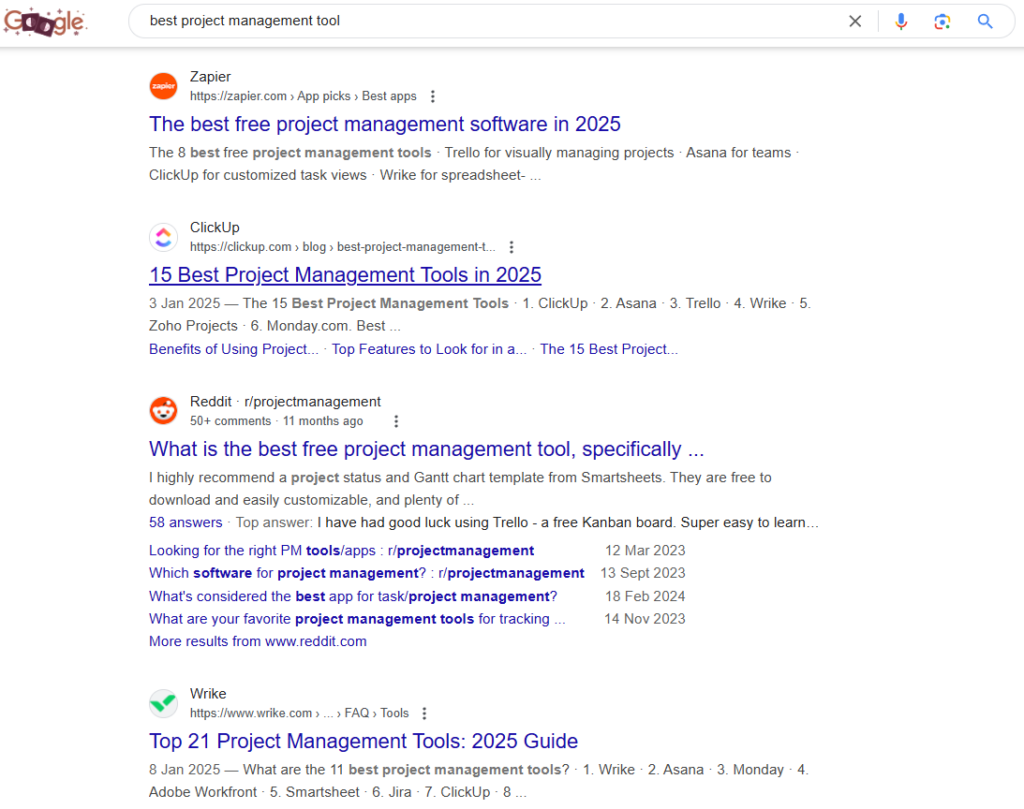
A Reddit thread sits in the #3 spot. Ahead of Wrike, PCMag, The Digital Project Manager, Microsoft, TechRadar, and G2.
Crazy! But it's your chance to get your product in front of thousands of potential buyers. All you have to do is skillfully plug your product into the discussion.

Sure, the links won't necessarily make your backlink profile stronger. But think about all the referral traffic and increased brand awareness you will get!
SaaS link-building FAQ
To finish, let's answer a few frequently asked questions about SaaS link building. To give my answers a bit more depth, I asked SEOs and marketers for their insights.
Is link building still important in 2025 for SaaS projects?
Link building is even more important for SaaS companies in 2025 than ever.
Let's break it down.
Although Google employees have indicated that backlinks aren't as important as they used to be, they never said they were unimportant. And there's a lot of research that confirms their impact on ranking.
For example, Ahrefs data shows a strong correlation between the referring domain count and keyword rankings or organic traffic volume. The 2024 study by Semrush confirms this correlation, while the Internet Marketing Ninjas research showed that 85% of pages in the top 10 spots had 1k+ backlinks.
Here's the shocker:
Ranking organically in number 10 doesn't cut anymore. Sometimes, even the top 3 spots don't get you on the first page because ads and featured snippets push out organic results, like in this example shared by Irina Maltseva, founder of onsaas.me.
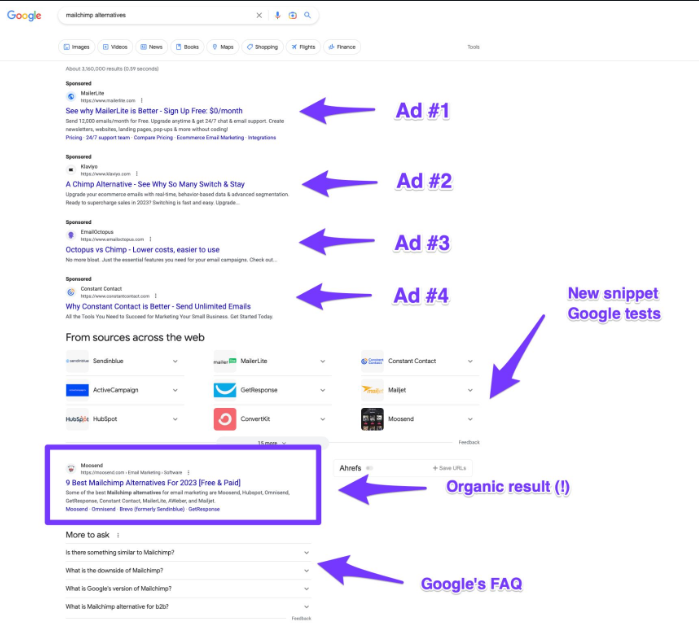
Because competition for these top spots is fierce, you need more links.
Finally, people rely more on AI chatbots like ChatGPT or DeepSeek and AI overviews for information. What can increase your chances of being cited by a chatbot? Frequent brand references from trusted sources.
What is the biggest challenge for SaaS link building?
Competition is the most significant challenge for SaaS companies.
As shown above, there's less real estate on search results pages available, and more and more companies want a slice of the pie—the SaaS industry has grown by 500% over the last 7 years, making it one of the fastest-growing.
Antonio Gabric believes this is particularly difficult for new brands without established authority.
The … challenge would involve building brand awareness… If you’re already a well-known brand or a first-mover, there’s a chance you’ve naturally acquired a lot of link equity. Starting link-building efforts for a new business that nobody has heard of can make it significantly harder to make an impact initially.
This makes sense. Unknown brands need to put more effort into educating people about their products. They have no relationships they could lean into, and organic link acquisition is virtually impossible if they don't rank in the top 3 spots. And how can you get there on a bootstrap?
How is link building for SaaS different from other industries?
Here are a few differences that come to mind:
First, if your SaaS product caters to global audiences, you must invest in international SEO and link-building.
A SaaS company trying to reach European readers needs links from important European blogs and leaders in both regional and specific languages to remain culturally relevant.
Moreover, the marketing funnel is longer in B2B SaaS than, say, in e-commerce. And you need resources to establish your product as a credible solution to their problems. So, not only landing pages but also product-led blog posts, case studies, whitepapers, webinars, and thought-leadership content.
This is both a challenge and an opportunity. You need to produce more content and build more links, but securing links to educational content is easier than to landing pages.
While the competition between SaaS companies is wild, they still have more opportunities than other sectors. For example, you can reach out to tech-focused websites (think Cloud, APIs, etc.), niche-specific ones (e.g., fitness, onboarding, project management), or from complementary products.
SaaS tends not to neatly fit into a niche, as they are both technological and into a niche vertical at the same time. It’s easier for SaaS to get links from websites with a technology background or other SaaS companies that have synergies.
Finally, unlike in other sectors, it's still possible to build free links in SaaS by establishing relationships with other companies, as Evelina Milenova, the SEO Manager at Opinion Stage, mentioned:
Different from most niches, in SaaS, you can build “free” links in the sense that they come from link exchanges, and there’s no pay involved. If you’re building links on travel, wedding, supplement, or legal sites (to name a few), you usually need to pay webmasters for each link placement.
You may look down at link exchanges as a gray-hat tactic, but the reality is that SEOs in the SaaS space use them to build links without major hiccups.
What are the risks involved in link building for SaaS?
There are a few risks that can potentially derail your SEO strategy.
- Link decay: Websites lose 8-12% of their links yearly, so you need to keep replacing them constantly.
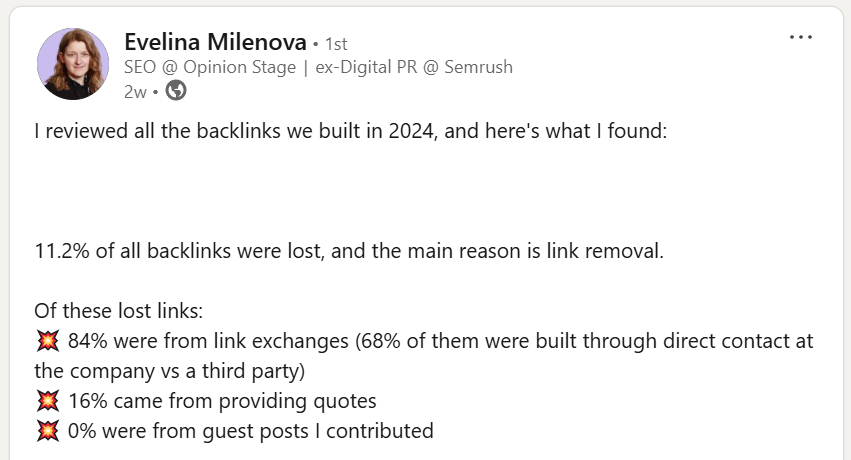
- Rapid technological changes: To keep up with competitors and take advantage of new technological developments, you need to innovate. New features and products require new marketing resources, and this means the need for more links.
- Algo updates: The SERPs have been super volatile over the last 18 months because of algo changes, and even the largest companies weren't immune (Yes, I'm thinking of you, Hubspot). This makes planning and tracking progress extremely challenging.
- Budget cuts: Link-building ROI attribution in SaaS is more complex than in other sectors because of the long funnel. Your execs may decide to pull your link-building budget if you can't prove value.
Sales cycles of SaaS products extend long enough, so it becomes challenging to correlate particular backlinks to actual customer purchases. The analysis of trackable data requires effective systems to link performance metrics.
What common link-building mistakes should SaaS companies avoid?
There are a few common pitfalls that can derail your SaaS link-building efforts:
Building links only to commercial pages
Companies with limited resources prioritize links to their homepages, landing pages, and BOFU content because that's where conversions come from. But this is difficult.
And not necessary. You can achieve similar results by building links to other pages, like your blog posts, and use internal linking to pass PageRank to your money pages.
Prioritizing SEO metrics over relevance
Metrics like domain authority or traffic are important. But they mean nothing if the link is irrelevant. For example, if it comes from a page in an unrelated niche. Or has an irrelevant anchor text.
But Paul DeMott thinks that niche-relevant sites can also be "irrelevant" if they don't target the same audience as your product does:
Your target audience will doubt your brand authority when your SaaS brand focuses on enterprise clients but secures most of its backlinks from beginner-level blogs.
Anchor text overoptimization
Irrelevant anchor texts can hurt your rankings. But so can over-optimized ones. I mean those keywords-rich ones, used out of context specifically to boost your page.
A good anchor text is woven naturally into the text and accurately describes what your page is about.
SaaS companies love to cram their keywords into every link like it’s a piñata. Don’t. It screams “spam” to Google. Mix it up with branded or natural anchors like “Check this out” or “Learn more”.
Using black hat tactics
SaaS businesses often resort to black hat tactics, like using PBNs or buying links, to score quick wins.
These schemes violate search engine guidelines, so any results are rather short-lived. The links either disappear or the SEs ignore them when ranking pages.
Using AI to create 'linkable' assets
Thanks to AI, creating content has never been easier. And I don't mean just text but also images and video.
However, easy means everybody can do it. So, if you're hoping to create content that stands out using AI tools, you're up for a disappointment.
Don’t get me wrong:
An AI tool like ChatGPT can help create excellent content, for example, by streamlining tasks like coding, research, or data analysis. However, at this stage, it lacks human creativity, personality, and depth, which are key differentiators when competing for people's attention.
Skipping the step of establishing a strong content base leads to weaker links. Investing in high-quality, informative content should precede aggressive link acquisition. Strong content attracts strong links naturally and sustainably.
Automating cold email
Outreach is super resource-intensive, so there's a temptation to automate the process, which is easy with the available software. The catch? Everybody does it. And hardly anybody replies to pitches.
SaaS teams spam inboxes with cookie-cutter pitches, then wonder why no one bites. Build relationships first—comment on blogs, share their content, DM them. People are way more likely to link to someone they actually like.
Final Words
Building links for SaaS companies may not be as challenging as for legal services or e-commerce, but it still requires expertise and, more importantly, extensive industry partner networks.
This isn’t something you can develop overnight.
If you would like to see results faster, outsourcing your SaaS link-building campaign to a specialist agency is the only alternative.
If you’d like to chat about your SEO needs, contact the Editorial.Link!








